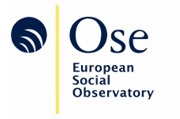The OSE was contracted by the European Trade Union Institute (ETUI) to conduct research which will result in the 21st edition of the ‘Bilan social’ (its shorter name in French), to be edited by Bart Vanhercke, Slavina Spasova and Boris Fronteddu. This year’s contributors include Karen Anderson, Anniek de Ruijter, Dalila Ghailani, Scott Greer, Éloi Laurent, Matteo Mandelli, Martin Myant, Jill Rubery, Sebastiano Sabato and Ramón Peña-Casas.
Social policy
The global environmental crisis is tending to create new social inequalities and reinforce existing ones. As this crisis will increasingly put pressure on the very core of the EU’s socioeconomic models, the OSE has been contracted by the European Trade Union Institute (ETUI) to produce a pilot version of a newsletter on the implementation of the ‘European Green Deal’, and especially the EU’s political commitment to a ‘socially just transition’. The purpose of the Newsletter will be to monitor European policies impacting both the environment and the European social model.
This research project culminated in the 20th edition of Social policy in the EU: state of play. This anniversary edition looks back at the main developments in EU social policymaking over the past two decades.
With inequality increasing across Europe and the EU not on track to achieve the Europe 2020 social objectives, the UK-based European Social Network (ESN) has again asked the OSE to provide scientific underpinning of its work on the European Semester. The focus will be on the impact of austerity policies on public social services management and provision, territorial disparities and evidence-based policy-making. Policy areas covered will include children’s services, homelessness and housing exclusion, community care and de-institutionalization as well as services to immigrants and refugees.
Bart Vanhercke and Jonathan Zeitlin (University of Amsterdam) have been tasked by the Luxembourg Presidency of the Council of the EU to assess how social and employment issues are being considered in the European Semester. The report will also pinpoint possible shortcomings of the current process and propose concrete suggestions on how the social policy dimension can be further enhanced within the EPSCO Council formation.
Jonathan Zeitlin (University of Amsterdam) and Bart Vanhercke conducted joint work on behalf of the Swedish Institute for European Policy Studies (SIEPS) on economic governance and social policy coordination in the European Semester and Europe 2020. The European Semester of policy coordination, introduced since the beginning of the Euro crisis, has prompted questions about the nature and dynamics of the EU’s emerging socio-economic governance architecture.
The OSE has been contracted by the European Trade Union Institute (ETUI) to conduct research, which resulted in a book on the “Social developments in the European Union 2012”. The 14th edition of this publication features authors such as Paul De Grauwe (From financial to social and political risks in the Eurozone), Alexander Trechsel and Claudius Wagemann (The EU in 2012: political and institutional tensions) and Georg Feigl, Sven Hergovich and Miriam Rehm (Beyond GDP: can we re-focus the debate?).
The OSE was awarded a contract with the European Trade Union Institute (ETUI), which consists of contributions to the ETUI Policy Brief series. This series allows for short papers in which researchers can expand upon and express critical and policy-oriented ideas.
The OSE was awarded a contract with publishing house EDIESSE, which publishes la Rivista delle Politiche Sociali (Journal of social policy), an Italian journal dedicated to being a reference point for debate, perspectives and analyses on welfare issues, to conduct research on the social developments in the European Union. The OSE will summarise, four times a year, the result of this research into a Digest (‘Osservatorio Europa’) for the journal.
